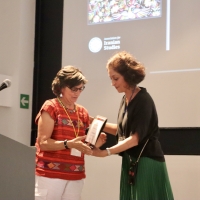US and Canadian Scholars Issue Open Letter Calling on University Administrators to Take Action on Protests and Violence in Iran
More than one hundred and ninety scholars and other academic stakeholders in the US and Canada have signed an open letter calling for action in response to the last month of protests in Iran, sparked by the September 16, 2022 death of the young Iranian-Kurdish woman, Mahsa Jina Amini, who was fatally beaten in police custody after being arrested for “improper hijab.” Amini’s death has sparked massive protests throughout Iran, largely led by women and girls, as well as high school and university students; as of last week other sectors of the Iranian population have begun to participate.
The scholars who have signed onto this letter call on high-ranking university administrators—chancellors, presidents, and provosts—to condemn the attacks on university students at Sharif University, Tehran, Iran, that took place on October 2, 2022, as well as at several other educational institutions, and to offer emergency admission to Iranian students-at-risk and to create scholar-at-risk (SAR) opportunities for Iranian academics and students.
“This is one of several efforts underway,” said one of the co-authors of the open letter, Camron Michael Amin. “We need our colleagues to bring this letter to the attention of their senior administrators and urge them to either expand existing SAR opportunities for Iranian students and faculty on an expedited basis or prioritize launching new initiatives. We know some institutions will be able to respond more easily than others, so we also encourage institutions to collaborative.”
View the full text of the letter as well as a link for those who wish to support this effort.
Persis Karim, the Director of Center for Iranian Diaspora Studies at San Francisco State University and the scholar who spearheaded the open letter initiative warns that the longer these protests go on, the more likely students will be endangered and face arrest. Many Iranian students and faculty will be seeking opportunities such as scholars-at-risk or to find ways to complete their education abroad. “The need to address this situation requires not just urgent but also sustained attention by American and Canadian institutions of higher education,” she adds.



